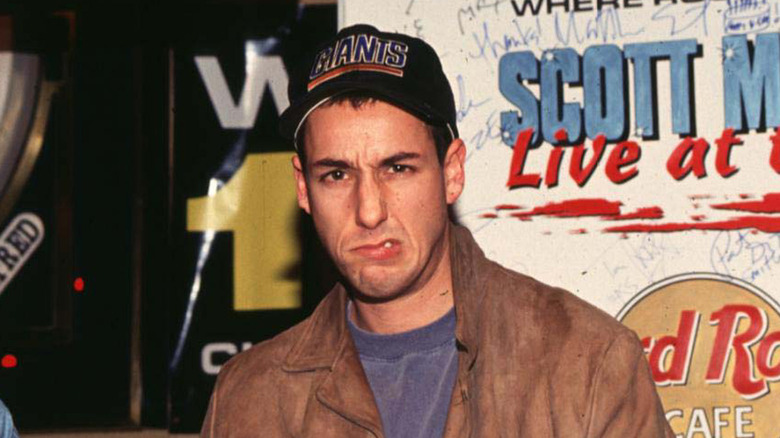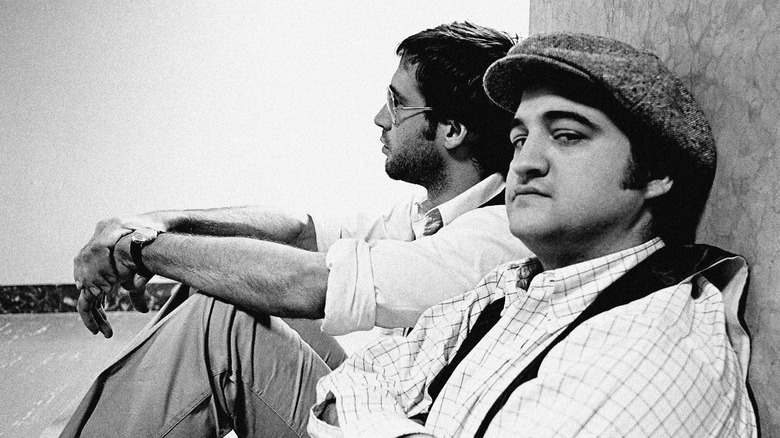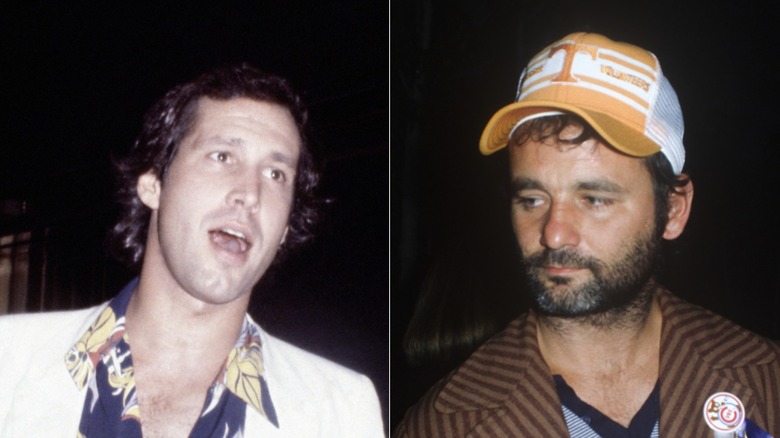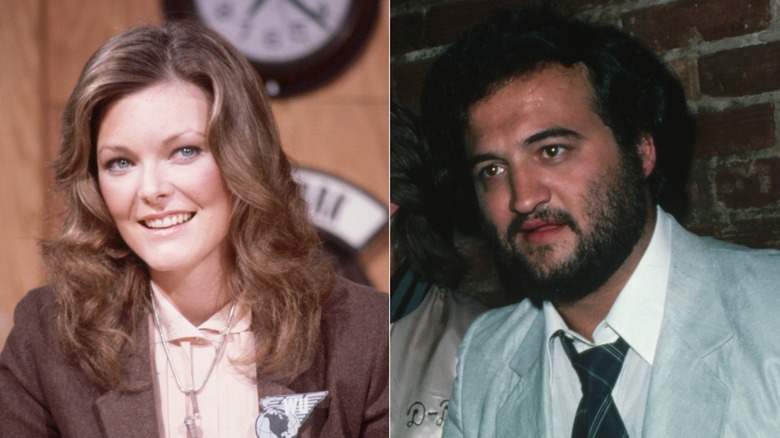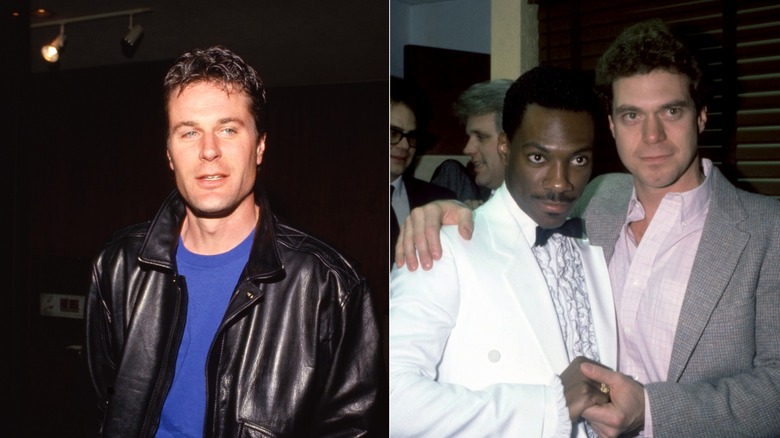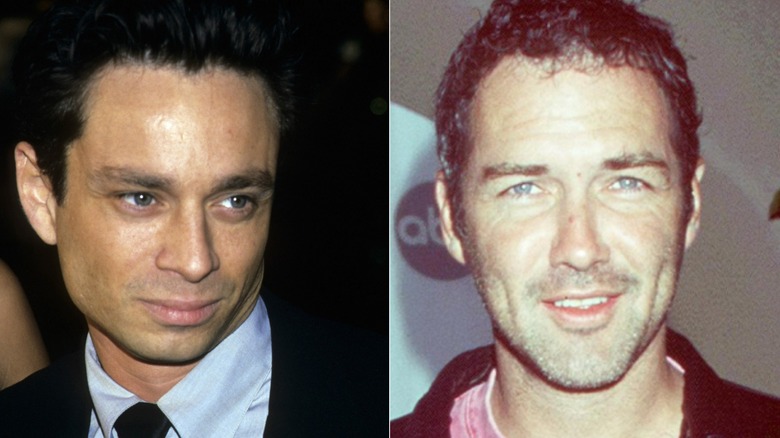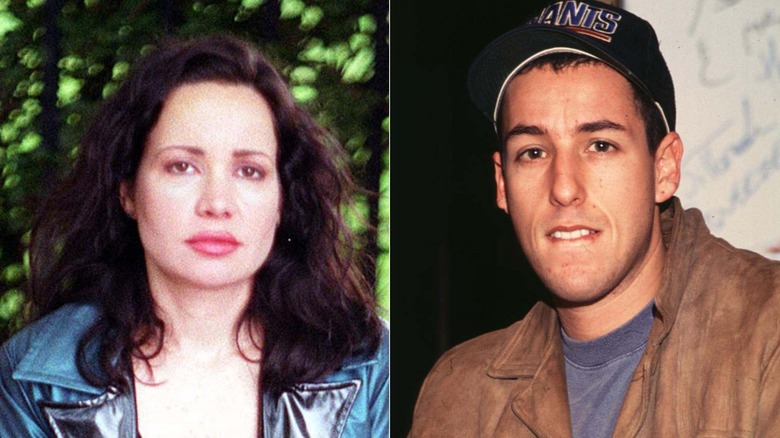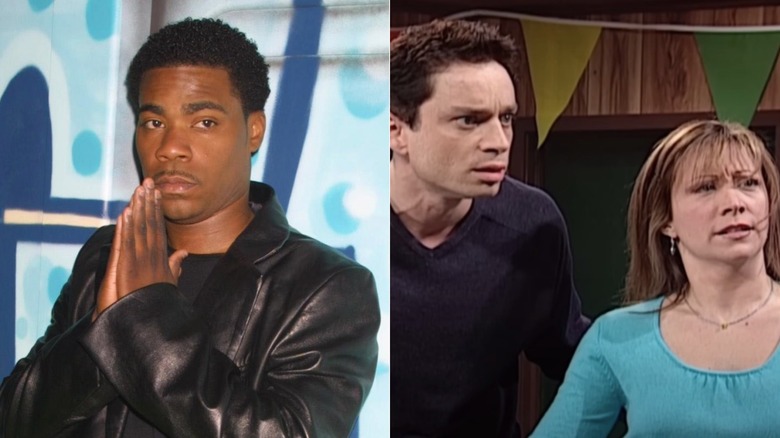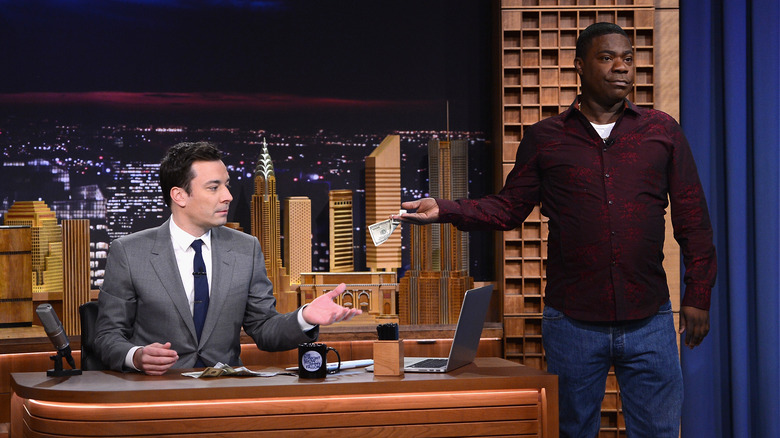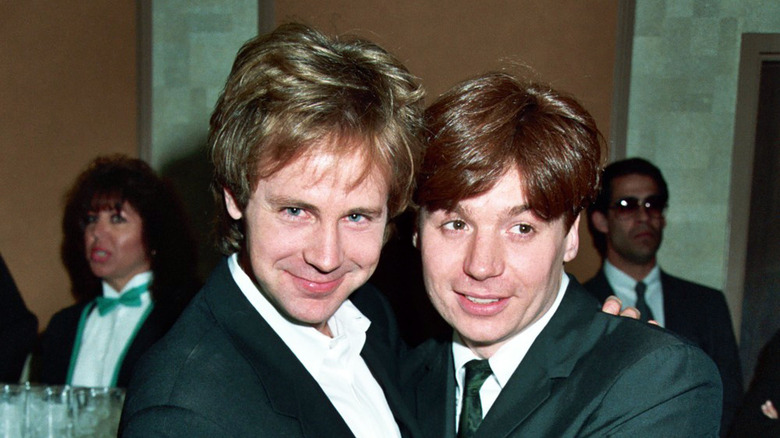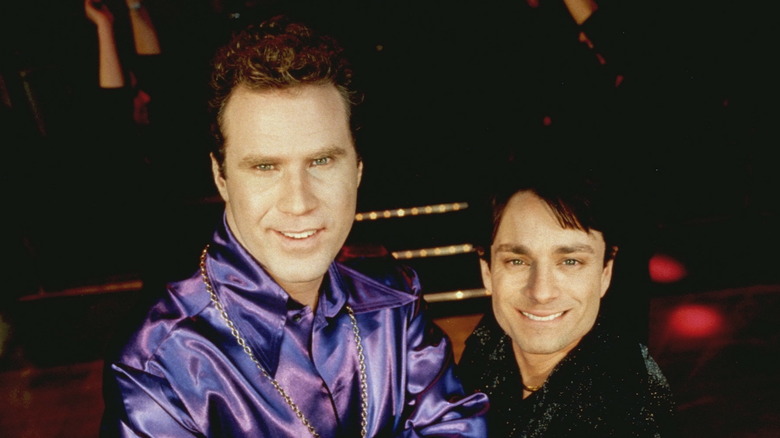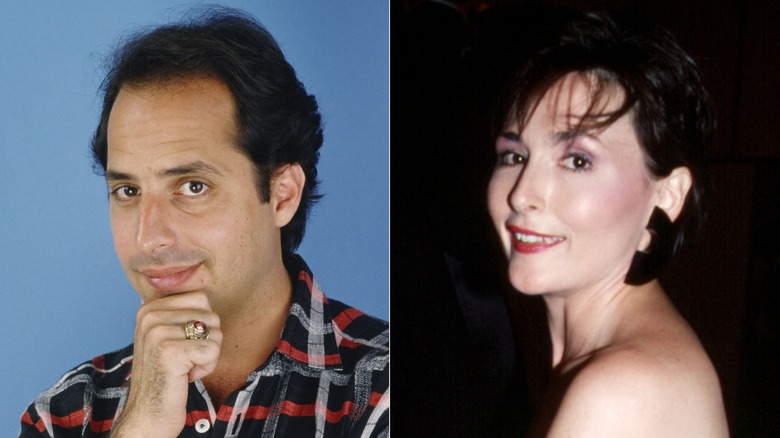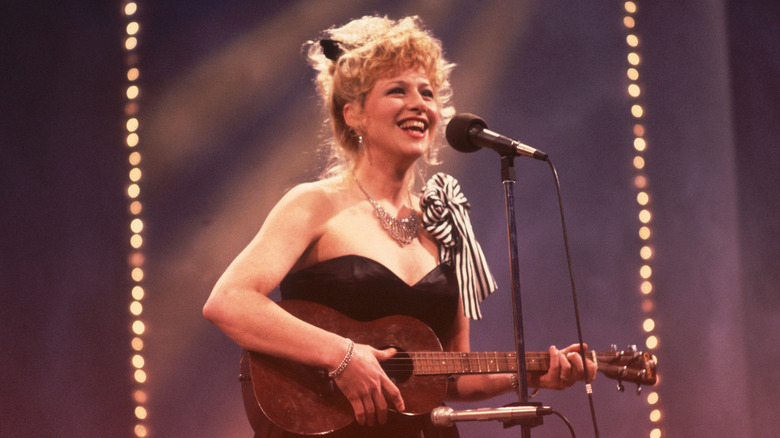SNL Cast Members Who Couldn't Stand Their Co-Stars
Back in the fall of 1975, television viewers heard a phrase for the first time that would become a part of the pop-culture landscape for decades to come: "Live from New York, it's Saturday night!" Since that landmark debut, "Saturday Night Live" has continued to maintain its role as television's pre-eminent satirical sketch-comedy showcase, introducing the world to a head-spinning array of comedy superstars over the years, ranging from Bill Murray to Adam Sandler to Pete Davidson and so many more.
Numerous former cast members have confirmed that the atmosphere behind the scenes was highly competitive. Sandler, in fact, looked back on his time with the show with a certain degree of regret over his behavior while part of "SNL." "I had a quick temper, quick reactions. I made a lot of dumb mistakes and said a lot of stupid things," Sandler told AARP. "I was selfish. I was competitive with other comedians and stuff."
To be fair, Sandler was far from the only "SNL" alum to embrace the show's competitive nature, which has resulted in some serious rivalries and feuds over the years. To explore more of this aspect of the show, read on for a look at "SNL" cast members who couldn't stand their co-stars.
John Belushi vs. Chevy Chase
Chevy Chase and John Belushi were both tapped for the cast of "Saturday Night Live" for the show's inaugural season back in 1975, but the two had actually known each other long before that — both had been performers in National Lampoon's off-Broadway Woodstock spoof "Lemmings." Even then, noted authors Doug Hill and Jeff Weingrad in their book, "Saturday Night: A Backstage History of Saturday Night Live," the two clashed. Chase, they wrote, would jokingly claim that he was responsible for making Belushi palatable to television viewers by teaching him how to use a fork when eating and shaving the hair from his back.
Chase and Belushi's rivalry grew even stronger during the first season of "SNL," when Chase immediately became the show's breakout star. As Chase's fame grew, so too did his arrogance. This rankled the rest of the cast but infuriated Belushi — who felt that Chase was receiving all the best material and the majority of the screen time. "I go where I'm kicked," Belushi would say. "They throw me bones dogs wouldn't chew on" (via Grantland).
When Chase exited "SNL" partway through the second season, there were fears that the show would bleed viewers without its No. 1 attraction; Belushi, however, was thrilled to see him go, and eventually went on to become a movie star in his own right until his tragic death in 1982.
Chevy Chase vs. Bill Murray
After quitting "SNL," Chevy Chase became a movie star — which he never let his former co-stars forget when he returned to host. He'd been replaced by Bill Murray, who was predisposed to loathe him — something Chase made easy due to his escalating arrogance. Tensions grew when the two appeared in a sketch together, with Murray making a crude joke about Chase's troubled marriage and Chase responding by referencing Murray's pockmarked face, joking that astronaut Neil Armstrong had landed upon it.
Five minutes before the live show was about to start, Chase found Murray in John Belushi's dressing room. "Let's go, sucker," Chase told Murray, via "Saturday Night: A Backstage History of Saturday Night Live." "This is my show now," Murray responded as he began throwing punches, with Belushi and Murray's brother, Brian Doyle-Murray, breaking the men up. "I found out later from ["SNL" creator] Lorne [Michaels] that John ... had been quite jealous about my rise to fame," Chase later recalled while appearing on "The Howard Stern Show," claiming Belushi had been poisoning Murray about him.
"It was really a Hollywood fight, a 'Don't touch my face!' kind of thing," Murray said in a 2012 interview with Empire. "So it was kind of a non-event." According to Murray, they subsequently buried the hatchet, and all was fine between them.
Jane Curtin vs. John Belushi
According to his "SNL" co-star Jane Curtin, John Belushi regularly declared his belief that women weren't funny. "John absolutely didn't like being in sketches with women," Curtin said during an interview with The Ringer. Series creator Lorne Michaels confirmed that, telling the outlet there were two lines that Belushi wouldn't cross: dressing in drag (a rule he broke to play Elizabeth Taylor), and appearing in a sketch that had been written by a woman.
In fact, Curtin also claimed that Belushi made it his mission to sabotage those writers' sketches at the table reads by giving a lackluster performance. "They were working against John, who said women are just fundamentally not funny," Curtin said during an appearance on "The Oprah Winfrey Show," via HuffPost. Curtin shared even more on "Watch What Happens Live." "There were a few people that just out-and-out believed that women should not have been there," Curtin said, clearly referring to Belushi, "and they believed that women were not innately funny ..."
Belushi's widow, however, believed that he was misunderstood, blaming his Neanderthal views on his upbringing. "He had that systemic sexism," Judy Belushi-Pisano said during a panel promoting the documentary "Belushi," reported Variety. "I think John actually was a woman's libber before I was, sometimes contrary to some things you might hear, John was very good with women, in general."
Charles Rocket vs. Joe Piscopo and Eddie Murphy
After the original Not Ready for Prime Time Players exited the show, "Saturday Night Live" returned in the fall of 1980 with a new cast and a new producer, Jean Doumanian, taking over for Lorne Michaels. The season was a disaster, and at the center was square-jawed Charles Rocket. Tall, lanky, and handsome, Rocket was tapped to anchor "Weekend Update," positioned as the next Chevy Chase.
Rocket didn't become the breakout star, as had been anticipated; instead, it was Joe Piscopo and 19-year-old Eddie Murphy who began garnering all the attention. Interviewed for "Saturday Night: A Backstage History of Saturday Night Live," Piscopo recalled the arrogance of some members of the cast, who assumed the show would propel them to instant stardom — as had been the case for the original cast — despite the awful material they were producing. That was particularly true of Rocket. Murphy and Piscopo, in fact, consciously disassociated themselves from the rest of the cast, with their sketches standing out by being far funnier. When Rocket later complained about Piscopo's "Weekend Update" bit getting more laughs than he did, a shouting match erupted. "You're not part of this cast at all!" Rocket yelled, calling out the two. "You're one-dimensional," Piscopo fired back, with Rocket then threatening to rip out Piscopo's throat.
Not long after that, Rocket was fired ignominiously after purposefully dropping an F-bomb during a sketch, forcing the network to issue an apology on his behalf.
Norm Macdonald vs. Chris Kattan
Norm Macdonald was reportedly not a fan of co-star Chris Kattan when the two were part of the "Saturday Night Live" cast together. "I don't find him funny," Macdonald said of Kattan in a 1997 interview with Rolling Stone. "What can I say? Never made me laugh." An anonymous insider told the New York Observer there was indeed bad blood between the two comedians. "They had a very acrimonious relationship," a source told the outlet. "Norm would rip [Kattan] to his face. Norm's a weird guy. If he doesn't like someone, he'll say it to his face."
Fellow cast member Will Ferrell recalled Kattan and Macdonald taking a flight together when Kattan took off his shoes and took a nap; when he awoke, his shoes were gone. Kattan accused Macdonald of stealing them, but he insisted he hadn't. "An entire season goes by," Ferrell said, recounting the story on David Spade and Dana Carvey's "Fly on the Wall" podcast. "And then Kattan and Norm are jousting back and forth, and then Norm finally goes, 'Oh yeah, one other thing: I did take your shoes ... threw 'em in the trash can.'" Added Spade, "He used to give Kattan so much s***."
In 2015, a few years before Macdonald's heart-wrenching death, Kattan insisted in a tweet that their feud was make-believe. "Norm MacDonald [sic] is one of the funniest guys I know and our SNL 'feud' was only for comedic purposes and was never anything other than satiric," he wrote.
Janeane Garofalo vs. Adam Sandler
Janeane Garofalo got off to a rocky start after joining the cast of "Saturday Night Live" in 1994. According to a now-infamous piece for New York magazine, she'd previously trashed the show in interviews, claiming "SNL" had become "unwatchable" and singling out Adam Sandler's comedy as "childish."
Her co-stars did not take kindly to her critiques; she told the magazine her experience on the show had been akin to hazing at a fraternity. "It's hard. It takes its toll on you," she said, while a friend said she was miserable and depressed. "She's absolutely destroyed as a person. The show has beaten the s*** out of her," the friend stated. Sandler, the article noted, refused to speak with Garofalo but eventually broke his silence toward her — but only to tell her off.
Sandler wasn't the only person on the show who disliked her. When she hesitated while trying to remember a line — because of her insistence on learning her lines instead of just reading off cue cards, which is the show's norm — producer Al Franken exploded. "Al went s***house. 'Read the f***ing cue cards!'" said someone who'd witnessed the incident. Garofalo, however, insisted that her time on the show had been a learning experience that sharpened her as a comedian. "But it doesn't mean I haven't cried — a lot — since I've been here," she confessed. She wound up quitting the show a few months before the end of the season.
Tracy Morgan vs Cheri Oteri and Chris Kattan
Tracy Morgan joined the cast of "Saturday Night Live" in 1996 and was not greeted warmly by two members of the cast who were already in place. In his memoir, "I Am the New Black," Morgan went off on Chris Kattan and Cheri Oteri, claiming that both treated him disrespectfully when he arrived. All those years later, he still held a grudge. "All I have to say about that is, where's Chris Kattan now? Where's Cheri Oteri now? That b**** can't even get arrested," he wrote.
Morgan added to the vitriol while recording the audiobook version. Gawker was the first to report that he went off-script and added a few choice comments about the pair. "They never going to host 'Saturday Night Live,'" he said, as reported by Entertainment Weekly, continuing to gripe about what he'd allegedly experienced from Kattan and Oteri. "They never treated me well," Morgan continued. "There were people that treated me beautifully, like Will Ferrell and Colin Quinn and Molly Shannon — I love them. But Cheri Oteri and Chris Kattan — I never cared for them either. F*** 'em."
Tracy Morgan vs. Jimmy Fallon
During his tenure with "Saturday Night Live," Tracy Morgan also took issue with some chronic behavior from fellow cast member JImmy Fallon. In an interview with Penthouse, Morgan admitted that he really disliked Fallon's habit of cracking up during sketches, getting laughs by breaking character. According to Morgan, he wasn't thrilled with Fallon's "laughing and all that dumb [bleep] he used to do — he wouldn't mess with me because I didn't [bleep]ing play that s***," Morgan said, as reported by Page Six. "That's taking all the attention off of everybody else and putting it on you, like, 'Oh, look at me, I'm the cute one.'" Morgan, in fact, gave Fallon a stern warning — that he apparently heeded. "I told him not to do that s*** in my sketches, so he never did," Morgan added.
Morgan got revenge with the help of fellow "SNL" alum Tina Fey when they appeared together in the NBC sitcom "30 Rock." In an episode, Morgan's character, Tracy Jordan, mimics Fallon's sketch-derailing breakdowns when his character begins doing the same thing, purposely creating live-TV mishaps in order to get cheap laughs in the show-within-the-show's sketches.
Morgan has since appeared many times on Fallon's "Tonight Show," so it's reasonably safe to assume that particular hatchet has long been buried.
Dana Carvey vs. Mike Myers
Mike Myers and his "Saturday Night Live" co-star Dana Carvey struck gold with their "Wayne's World" sketches, with the characters making multiple appearances on the show before spinning off into a hit movie that was successful enough to spawn a sequel. When both embarked on solo movie careers, Carvey's sputtered; Myers, however, achieved even greater success with his "Austin Powers" spy spoofs, playing both the swinging British super spy and his nemesis, Dr. Evil.
It was the latter character, in fact, that was reportedly at the center of a rift that had formed between the two. In 2016, Carvey appeared on "The Howard Stern Show," where he confirmed that he was taken aback when he saw Dr. Evil — which he felt was Myers' direct ripoff of Carvey's impression of "SNL" empresario Lorne Michaels. "When I saw Mike do it, I did kind of go, 'Hmmm...'" said Carvey, referencing Dr. Evil's tendency to place his pinky finger in his mouth, which had been part of his Michaels impression. "It's a really funny affectation because it's so specific," he added.
He compared their relationship to siblings, admitting their onscreen partnership had been entirely accidental. "We were never meant to be a comedy team," Carvey admitted. "Mike just invited me into the sketch, but, you know, I'm really grateful that he did ..." They subsequently made up and went on to resurrect their "Wayne's World" characters in a 2021 TV commercial.
Will Ferrell vs. Chris Kattan
Future movie star Will Ferrell teamed up with Chris Kattan for a series of popular "Saturday Night Live" sketches, playing two guys in a nightclub who danced their butts off to Haddaway's "What Is Love." Those characters were fleshed out to become the Butabi brothers in the big-screen spinoff, "A Night at the Roxbury."
In his memoir, "Baby, Don't Hurt Me," Kattan claimed (via an excerpt in Page Six) that Lorne Michaels — who was producing the film — encouraged him to hook up with director Amy Heckerling, whom Michaels feared was looking to exit the project. (She wound up producing.) Kattan later called Ferrell several times but never received a response. When they finally returned for the 23rd season of "SNL," Kattan asked what was up, with Ferrell revealing he'd found out about the secret relationship and felt betrayed. "So, I got all your messages, but I didn't call you back because I didn't want to talk to you," Kattan claimed Ferrell told him. "I don't want to be your friend anymore."
It should be noted that Heckerling's daughter, Mollie, issued a since-deleted tweet (via Vulture) confirming that her mother and Kattan had a brief affair, but that it happened well after production was underway. Heckerling herself dismissed all of Kattan's claims, telling the Daily Beast, "He's a nut. ... I don't even want to know or hear the dumb s*** he came up with."
Jon Lovitz vs. Nora Dunn
Nora Dunn had a tendency to clash with other members of the "Saturday Night Live" cast, but particularly with Jon Lovitz. "I think we were a dysfunctional family. He and I had a love-hate relationship," Dunn said of Lovitz in a 2015 interview with Salon. According to Dunn, her background in theater didn't gel with Lovitz's more chaotic approach, which often led him to disrupt her attempts to rehearse. "So I would get very irritated with Jon, and we'd have arguments," she recalled.
Dunn, of course, is remembered for her well-publicized decision to boycott an episode hosted by controversial comic Andrew Dice Clay, due to criticisms that his material was homophobic and sexist. Lovitz shared his recollection of that incident in an episode of "The ABCs of SNL" podcast. "Anyway, it's the [second to last episode of the season], and Nora, uh, you know, she caused a lot of trouble and she was very hard to get along with, so [SNL] wasn't going to ask her back, anyway," Lovitz said (via Uproxx), claiming Dunn's principled stance was just a publicity stunt that left the rest of the cast feeling betrayed because she'd made them look bad for not joining her boycott. "Anyway, the next week was our last show, and Nora was back, and everyone was like, they just wouldn't speak to her," Lovitz said, recalling the chilly reception she received by her co-stars. "Like, an iceberg."
Victoria Jackson vs. everyone
Victoria Jackson spent six seasons in the "Saturday Night Live" cast, known for her high-pitched voice, ukulele-fueled songs, and gymnastic handstands. Speaking with Salon, Nora Dunn admitted she didn't get along with Jackson at all. "I couldn't work with her because we weren't on the same page — ever," Dunn said. "We weren't even in the same book. We happened to be on the same show." Jackson, however, remembers Dunn and fellow cast member Jan Hooks ostracizing her. "Her and Nora were very mean to me, for the whole time we were there," she told the "Wasn't That Special" podcast, claiming that the women were jealous because she was landing movie roles and they were not.
However, it was Jackson's religious fervor that really wound up irking the other members of the cast. Feeling that it was her duty to share her beliefs with her co-stars, she regularly proselytized to them; one Christmas, in fact, she gave her co-stars audiobook versions of the Bible. The gifts were not well received and were returned to her. When producer and performer Al Franken confronted her, she responded. "Maybe I'm overcompensating, because everybody here is dying and going to hell, and I'm supposed to tell them about Jesus," she told him, as she recalled in an interview with SF Weekly. "He never talked to me again."
